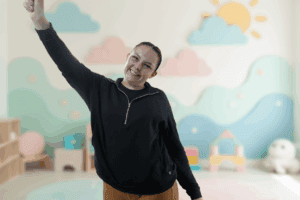Pretoria Volunteer Emergency Services founder Hugo Minnaar said PVES responds to about one to two suicide attempts every second day and one suicide every week.

When Safe Talk founder Lino Muller talks about suicide – the rising numbers in South Africa and the lack of awareness in the community – he speaks from the heart because his own brother killed himself about 25 years ago.
“He was about 20 when he took his life. He took my uncle’s gun and shot himself. His funeral was on the day of my wedding.”
That experience – and what he has learned over the years – makes him passionate when he says that people who say suicide is a selfish act couldn’t be more wrong.
ALSO READ: More than half of SA employees diagnosed with mental health issues linked to work
“He felt we were better off without him, so it was the opposite of selfish, which hurt more later on. “At the time, it was a shock, but we weren’t educated enough,” he said.
“Twenty-five years ago, we had the same stigma around suicide, where we all sort of judged him for it and said he was selfish.”
Nothing being done about mental health
He said when he visited the UK in 2015, the mainstream conversations were around mental health. However, nothing was being done about it.
“I started doing work in the UK for non-governmental organisations in mental health and started lecturing on suicide prevention. Then I started understanding what my brother went through.
“When I came home in 2023, I decided to start implementing it here because we had more adversities in South Africa, and our statistics were much higher than the UK. That’s when I decided to start Safe Talk,” he said.
Safe Talk is a suicide prevention not-for-profit organisation which does education and awareness training specifically on the signs to watch for in people around you who may be suicidal. Muller said from 2024 to 2025, there were an estimated 14 000 suicides in South Africa. And the number is rising.
ALSO READ: Urgent mental health support needed as SA teachers buckle under pressure
“We run suicide prevention workshops to destigmatise suicide and create awareness and help understand what mental health is,” he said.
Muller said part of his mission is to become the leading mental health organisation involved in training doctors, nurses, police and especially teachers about suicide prevention.
“In South Africa, we have a culture of being hard, being aggressive, and we need to teach people differently,” he said.
Increase in suicide attempts
Pretoria Volunteer Emergency Services (PVES) founder Hugo Minnaar said PVES responds to about one to two suicide attempts every second day and one suicide every week.
“It is a concern to us to see this big increase in suicide attempts, especially by the younger generation.
“Normally, the age is about 14 to 15 years old. The suicide is attempted with over-the-counter medication or those prescribed to other people, and then they take an overdose.”
Minnaar said most of the suicide attempts involving medication were by females, while males used measures such as a handgun or hanging themselves.
ALSO READ: How Covid changed our lives, mental health and shopping habits
*Sarah, a divorced single mom, described her journey with suicide as a long one.
“Life has been tough, lonely… Sometimes I felt like I was cursed. My mom died when I was two while she was shielding me from a petrol bomb, and my dad when I was 16.
“His death knocked me right down because he was my lifeline. I’m also a burn survivor, so I’ve been bullied a lot in school. I’ve never fitted in with my stepmom’s family, which has its own challenges. Then being with a foster family had another set of challenges.”
Financial struggles
Sarah has had five suicides in her family, the most recent being on Christmas Day last year.
“For a moment, it did trigger something. I felt like everyone I loved was leaving me, and the world seemed so cruel. I didn’t want to be part of it anymore and often found myself going down that road, thinking of the best way to do it.
“The financial struggle and lack of emotional and mental support all trigger different negative emotions.
“I tried twice – once after my father’s death and since during my marriage,” she said.
Sarah met Muller through her life coach.
“I’m not sure how to explain, but you know when someone is actually listening to you to understand you and genuinely be there for you?
“That is Lino. He listened with an open mind, a gentle approach. He makes each of us feel heard, understood and reminds us we were not alone,” she said.
Sarah said her life coach and sessions with Muller helped her stay grounded.
ALSO READ: How mental health affects entrepreneurs
“Now I’m putting myself out there to help others. My life coach made such a huge impact that she inspired me to become a life coach myself.
“We come from times when we were taught to sweep our emotions under the rug and were not taught how to deal with what we go through healthily. We were not given the chance to be heard, to be understood. Sometimes that’s all we need,” she said.
Sarah said it was important to remember that we are not alone and don’t need to be scared or embarrassed to ask for help.
*Not her real name.






